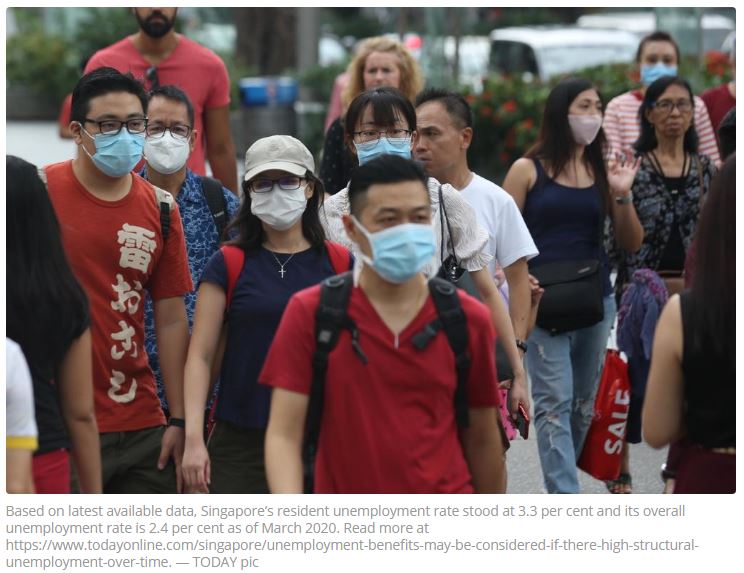Singapore senior minister: Unemployment benefits may be considered if there is high structural unemployment over time
SINGAPORE, July 23 — Singapore has managed to keep unemployment rates relatively low so far through traineeship and job matching programmes, in spite of the devastating impact of the Covid-19 pandemic.
However, it may have to consider instituting some form of unemployment benefits if this approach fails and Singapore ends up with high structural unemployment over time, Senior Minister Tharman Shanmugaratnam said yesterday.
Tharman, who is also the Coordinating Minister for Social Policies, was speaking at a virtual dialogue organised by the Lee Kuan Yew School of Public Policy (LKYSPP) and streamed live on Facebook.
He noted that unemployment benefits or unemployment insurance programmes are needed in advanced countries with high structural unemployment.
“We don’t need it in Singapore yet because our unemployment rates are very low and we’ve been able to get people back into jobs relatively quickly,” he said in response to a question from a viewer on his thoughts on unemployment insurance.
Based on latest available data, Singapore’s resident unemployment rate stood at 3.3 per cent and its overall unemployment rate is 2.4 per cent as of March.
These numbers are lower than the highs seen during the severe acute respiratory syndrome (Sars) outbreak and the global financial crisis, the Ministry of Manpower said on April 29.
However, Manpower Minister Josephine Teo had said that these figures also need to be seen in context. While the situation appeared normal in January, with businesses gearing up for the Chinese New Year festivities, a sharp contraction could be seen once Singapore rolled into February, she added.
Yesterday, Tharman reiterated that the Singapore Government has managed to keep unemployment rates “far lower than elsewhere” because it has been able to quickly coordinate a range of programmes that involve retraining workers, placing them on attachments and traineeships, and getting them back in jobs more quickly.
He added that given the weak demand by employers for permanent job roles, Singapore is devising schemes where the Government will subsidise attachments and traineeships in firms so that people are “doing real work”, which would hopefully lead to a permanent job position.
“If you do that active labour market policy well, we won’t need to invent an unemployment insurance scheme. If we fail and, over time, we find we have high structural unemployment, you’ll need some form of unemployment benefit scheme,” he said.
Apart from Singapore, Germany and other Northern European countries were examples of advanced countries that have managed to keep unemployment in check through an active labour market policy. This is in contrast with countries such as the United States, which provide those who lost their jobs with unemployment benefits, but leave it to market forces to get them to return to work.
“Once you’re unemployed, particularly for some period of time, your skills tend to fade and employers tend to disfavour you when you try to get back into the market,” Tharman said. “So the longer you’re unemployed, the more difficult it is (over time) to get back on track (to find) a decent job (and be) on track for wage mobility.”
The dialogue was on the topic of whether the Covid-19 pandemic has led to a push for big governments in the future. Apart from Tharman, the other panellists were John Micklethwait, who is news agency Bloomberg’s editor-in-chief, and Rana Foroohar, a global business columnist at the Financial Times.
The session, which was moderated by Associate Professor James Crabtree from LKYSPP, delved on a wide range of issues surrounding the role of governments in a crisis, the push for governments to play a bigger role as a result of managing the Covid-19 pandemic, as well as the reasons why different governments have handled the crisis differently.
Turning to the main theme of the dialogue, Tharman said that the focus should not be on the size of the government and its budgets. Instead, it should be on whether a government is effective in achieving outcomes efficiently and in an inclusive manner.
“So you don’t necessarily have to be very large, but you have to be very good at the most important things you should be doing and go about it with the spirit of an activist,” he said.
A fundamental priority of governments in the future is its policies on the provision of public goods, such as education and healthcare, he added.
Given that the market does not provide these goods in an equitable manner, the state has to get involved “as a curator and as a coordinator”, he said.
“So if you focus on public goods and you try and do it well, and you try to leverage the energies of the private sector and on communities, you have an effective state So do the things that the state is meant to do as well as possible. It doesn’t require a huge amount of resources,” Tharman said.
Amid the doom and gloom brought on by the pandemic, the panellists were each asked for a positive takeaway from the ongoing crisis. In his response, Tharman talked about the recognition of the role of ordinary essential workers.
“Those who are doing some of the toughest jobs are now getting a lot more respect and there’s a sense in society that we have many silent heroes among us and they’re not always the people with the best qualifications or these sort of top jobs. They’re ordinary people who are helping to keep our society together in crisis,” he said. — TODAY
Source: https://www.malaymail.com/news/singapore/2020/07/23/singapore-senior-minister-unemployment-benefits-may-be-considered-if-there/1887175


 Thailand
Thailand




